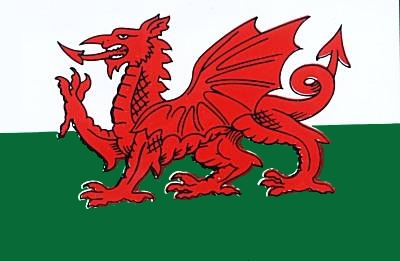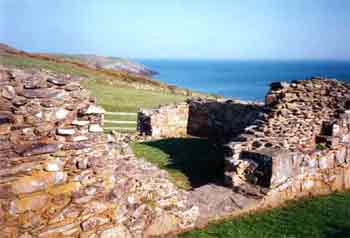
Welsh Flag^
We
Saint David's Day

Welsh Flag^
We
St. David, or "Dewi Sant", as he is known in the Welsh language, is the patron saint of Wales. He lived in the 6th century and during his life he was a Celtic monk and archbishop, and he was one of the many early saints who helped to spread Christianity among the pagan Celtic tribes of western Britain.

St David's Birthplace^
David travelled far on his missionary journeys through
Wales, where he established several monasteries. The one he founded in Menevia
in South-western Wales was noted for extreme asceticism. David and his monks
drank neither beer nor wine - only water - while putting in a full day of
intense study and manual labour to help maintain live at the monastery and to
keep themselves fed - as well as the many pilgrims and the poor and needy
in their neighbourhood.
It is claimed that David ate mostly bread and herbs. Despite this supposedly
meagre diet, it is reported that he was tall and physically strong. He is also
known as 'Dewi Ddyfrwr' (David the Water Drinker).
David is said to have been of royal lineage. His father,
Sant, was the son of Ceredig, who was prince of Ceredigion, a region in
South-West Wales. His mother, Non, was said to be a niece of King Arthur.
St. David's Day, as celebrated today on March 1st (the day
of his death in 589), dates back to 1120, when David was canonised by Pope
Callactus the Second, and March 1st was included in the Church calendar.
It is not certain how much of the history of St. David is
fact and how much is mere speculation, as the first manuscripts recording his
life date from the 12th century, nearly five hundred years after his death.
In 1996, though, bones were found in St. David's Cathedral, which, it is
claimed, could be those of David himself.... Could these bones be his?